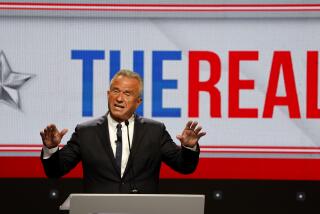Attacks on Dean Just Slide Right Off
- Share via
When Howard Dean appeared on NBC’s “Meet The Press,” the reviews were scathing, with most pundits calling the interview earlier this year a disaster. But others saw it differently. Traffic on Dean’s Web site soared, and he collected more than $100,000 in the next 24 hours.
When Dean suggested America was no safer with Saddam Hussein in custody, rivals in the Democratic presidential contest seized on his comments as a major gaffe. But days later, more than 30 New Jersey lawmakers -- joined by Gov. James E. McGreevey -- elbowed onto a packed stage to endorse him.
The former Vermont governor has millions in the bank, more than any Democrat running, and a legion of followers, linked by the Internet, who crowd campaign events from Manchester, N.H., to Yuma, Ariz.
But there is one advantage that has proved even more valuable for the impulsive and irrepressible Dean: a Teflon coating.
For weeks, frustrated opponents have attacked the Democratic front-runner on everything from his skimpy defense and foreign policy credentials to the secrecy he slapped on his gubernatorial records. Nothing has stuck.
Stumbles, such as Dean’s remark about Confederate flag-wavers, and factual misstatements, such as his assertion that no other candidate was discussing race before white audiences, have not only failed to slow his momentum but redoubled the commitment of Dean supporters.
“It’s about all of us saying [expletive] to all the pundits,” said Michael Cannon, 49, a New Jersey state worker who attended a rally in Trenton with a Dean sweat shirt, T-shirt and button on the back of his cap.
“Whenever negative stories surface, that just proves to me that I should be behind him all the more,” Cannon said.
There has always been a strong anti-establishment flavor to the Dean campaign. So whenever he fumbles in the eyes of so-called experts, it makes him all the more attractive to disaffected Democrats scornful of institutions like the major media.
The campaign even posts some of the harsher criticism on Dean’s Web site to spur fundraising. When a mysterious political group called Americans for Jobs, Healthcare and Progressive Values began airing an anti-Dean ad earlier this month with images of Osama bin Laden, the former Vermont governor’s camp amassed $552,000 in a three-day Internet fundraising push.
“It’s a polite way of saying where you can take it,” Dean said. But even more, he seems to benefit from his unscripted, uncompromisingly blunt talk. Supporters see the occasional miscue as perfectly understandable, even virtuous. No matter that Dean has already apologized several times during the campaign, most famously for his statement that he wanted to be the candidate for “guys with Confederate flags in their pickup trucks.”
“It shows he’s human,” said Clifford Rames, 38, another Dean backer from New Jersey, who appropriated a blue-and-gold “Dean for America” sign as a souvenir from the McGreevey rally. “He’s a person who goes to work every day and occasionally messes up,” Rames said, which suggests that Dean would not only be “a human president, he would understand the average person.”
But skeptics, fearful that Dean would be a disaster as the Democratic nominee, say he may be getting the wrong signal from his fervent followers, in the same way an ill-mannered child is indulged by overly protective parents.
“Whenever he screws up, the campaign is quick to point out that e-mail traffic is up, contributions over the Internet are up,” said John Weaver, a former advisor to Republican Sen. John McCain of Arizona who now consults for Democratic candidates.
“But those are all coming from tried-and-true supporters.... Surveys suggest a limit to his growth potential for a general election campaign, and that’s what is worrisome to Democrats.”
Already, rivals have seized on some of Dean’s more provocative statements -- including his recent comments regarding the capture of Hussein -- to suggest the damage his comments could do to him, along with fellow Democrats, in a general election campaign.
And on Friday, Dean was again explaining a provocative statement, this one made in an interview with the Concord Monitor in New Hampshire.
In that interview, Dean said it was premature to recommend what penalty Bin Laden should face before he’s been legally determined to be guilty of the Sept. 11 terror attacks.
“I still have this old-fashioned notion that even with people like Osama, who is very likely to be found guilty, we should do our best not to, in positions of executive power, not to prejudge jury trials,” he said.
Friday, Dean said that the sentiment he expressed does not mean that he sympathizes in any way with Bin Laden.
“As a president, I would have to defend the process of the rule of law. But as an American, I want to make sure he gets the death penalty he deserves,” Dean told Associated Press in an interview.
The Democratic Leadership Council, a centrist group that has feuded with Dean throughout the year, issued a statement last week asserting Dean’s “running-mouth disease” had produced a storehouse of “treasure for Karl Rove, whose opposition research file on Dean must be bulging like Santa’s sack of toys.”
Rove is Bush’s chief reelection strategist.
But others say Dean’s ability to withstand attacks -- and even gain strength as a result -- speaks to a depth of partisan support that could make him formidable in a general election.
Paul Begala, a Democratic strategist who helped elect President Clinton, compared Dean to the politician first fitted with the Teflon label, Ronald Reagan.
“He had that rock-solid base of social conservatives,” Begala said of Reagan. “When he raised taxes in California and again in Washington, they didn’t care. Divorced. Didn’t care. Didn’t go to church. Didn’t care.
“Things that would have killed other politicians were fine for him because he had tapped into an important constituency in his party and he had that base.”
In the same way, Begala said, Dean’s strength with core Democrats gives him the flexibility to reach out to swing voters should he win the party’s nomination. For all its seeming novelty, the Dean phenomenon is not entirely new. Just about every presidential campaign of the last generation has featured at least one hopeful playing the role of political outsider, and embraced by followers as the only candidate telling the truths that others avoid.
In 1976, Jimmy Carter, the former peanut farmer and ex-Georgia governor, tapped disgust over Watergate to beat a field of Democratic establishment figures and win the White House. In subsequent campaigns, the late Sens. Paul Simon of Illinois and Paul E. Tsongas of Massachusetts enjoyed brief favor thanks to their unconventional appeal -- Simon for his unabashedly nerdy appearance and Tsongas by making painful deficit reduction his cause.
Four years ago, the political fashion was authenticity and the chief beneficiary was McCain, who made “straight talk” more than just a campaign slogan. (He even snapped at voters when he didn’t like their questions.) Perhaps the biggest difference this time is the Dean campaign’s creative use of the Internet, as both an organizing tool and continuous feedback loop.
The candidate’s Web log, or blog, an interactive forum that reflects the campaign’s freewheeling approach, permits immediate two-way communication among the candidate, his campaign leadership and Dean’s grass-roots supporters, without a media filter. Even more, it gives Dean backers a strong sense of connection that makes them deeply committed to their candidate -- and eager to rally against any perceived attacks.
“Most of his supporters are savvy enough about politics to know the media mis-contextualizes things,” said Chris Dalzell, 28, as he left a Dean rally in Las Cruces, N.M. And so whenever Dalzell, the head of Students for Dean at the University of Texas, El Paso, has concerns, he e-mails them directly to the chief of Dean’s Texas campaign, who unfailingly responds.
“We have a direct link,” Dalzell said. “We can talk to the campaign any time we want.”
To supporters, it helps, too, that Dean is new to the national scene and unpolished. There is still a bit of everyman to the Democratic pacesetter, with his dowdy suits, slight paunch and penchant for saying things he later regrets.
“Everybody has these pat answers and they’re willing to flip-flop, but he’s not used to all this,” said Esi Burke, 58, who went to Memorial Auditorium in Burlington, Iowa, to hear the man her sister has been talking about since last summer.
“He’s going to make mistakes” and that fallibility, Burke said, makes Dean most appealing.
More to Read
Get the L.A. Times Politics newsletter
Deeply reported insights into legislation, politics and policy from Sacramento, Washington and beyond. In your inbox three times per week.
You may occasionally receive promotional content from the Los Angeles Times.











